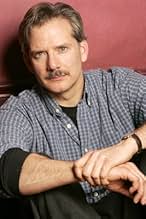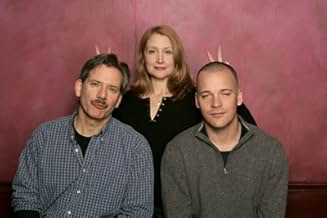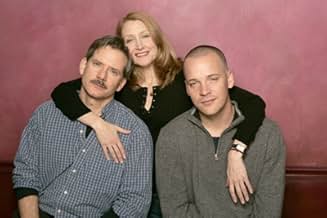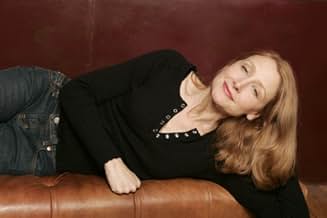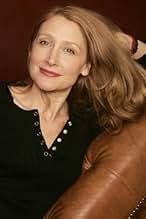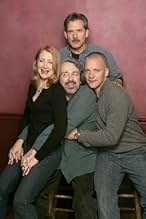IMDb RATING
6.4/10
2.5K
YOUR RATING
A grief-stricken screenwriter unknowingly enters a three-way relationship with a woman and her film executive husband - to chilling results.A grief-stricken screenwriter unknowingly enters a three-way relationship with a woman and her film executive husband - to chilling results.A grief-stricken screenwriter unknowingly enters a three-way relationship with a woman and her film executive husband - to chilling results.
- Awards
- 1 win & 2 nominations total
Craig Hamrick
- Party Guest
- (voice)
- (uncredited)
Jason-Shane Scott
- Robert's Masseuse
- (uncredited)
Bridgetta Tomarchio
- Female Guest
- (uncredited)
- Director
- Writer
- All cast & crew
- Production, box office & more at IMDbPro
6.42.5K
1
2
3
4
5
6
7
8
9
10
Featured reviews
High Praise For Dark, Brooding Story
I thoroughly enjoyed this film. Mr. Lucas directed a very cinematic version of his stage play, and assembled an outstanding cast. Peter Sarsgaard, Campbell Scott and particularly Patricia Clarkson, give layered, complex, award-worthy performances.
This film reminds me of another along the same genre, American Beauty, which also examined difficult and complex relationships, and attempted to do so with both humor and pathos.
Because this film is part thriller, part black comedy, part searing emotional drama, it had me going on many levels.
Again, Patricia Clarkson should be praised highly for her ability to make the reactions of her character so real! I have not always been a Craig Lucas fan, as I sometimes find his work to be a bit preachy (Prelude to a Kiss), but with this film, and his obvious director's eye, I look forward to his next effort.
This film reminds me of another along the same genre, American Beauty, which also examined difficult and complex relationships, and attempted to do so with both humor and pathos.
Because this film is part thriller, part black comedy, part searing emotional drama, it had me going on many levels.
Again, Patricia Clarkson should be praised highly for her ability to make the reactions of her character so real! I have not always been a Craig Lucas fan, as I sometimes find his work to be a bit preachy (Prelude to a Kiss), but with this film, and his obvious director's eye, I look forward to his next effort.
Greek Tragedy
Somehow, this movie managed to hold my interest despite the fact that I never really cared about the characters or what was going to happen to them next. It's not a love story. Not a very good relationship tale. Not a mystery or thriller. Instead, Dying Gaul is a modern day Greek tragedy that uses Hollywood and homosexuality as simply vehicles to generate interest.
This is Craig Lucas' first time in the director's chair. He wrote The Secret Lives of Dentists (previously at Sundance, starring Patricia Clarkson). The movies tackle the same themes---the value and meaning of marriage, the impact of dalliances, the complexities of finding happiness and satisfaction without veering from tradition. But Dying Gaul comes at it with a different orientation, and even outcome.
Patricia Clarkson is always excellent, but here she shows a little evil in her character, which is outside her normal range. Unfortunately, the rest of the cast comes off as wooden, certainly uninspired. Pay attention, because there are liberal doses of philosophy in the form of quotes and counsel. But the real tragedy here is the lack of a meaningful story or compelling characters.
This is Craig Lucas' first time in the director's chair. He wrote The Secret Lives of Dentists (previously at Sundance, starring Patricia Clarkson). The movies tackle the same themes---the value and meaning of marriage, the impact of dalliances, the complexities of finding happiness and satisfaction without veering from tradition. But Dying Gaul comes at it with a different orientation, and even outcome.
Patricia Clarkson is always excellent, but here she shows a little evil in her character, which is outside her normal range. Unfortunately, the rest of the cast comes off as wooden, certainly uninspired. Pay attention, because there are liberal doses of philosophy in the form of quotes and counsel. But the real tragedy here is the lack of a meaningful story or compelling characters.
Say It Isn't So
I would be hard pressed to name a trio of actors that I could be more excited to see than the stars of his film. Been rooting for Clarkson for years; we all know Sarsgaard is Oscar material in the years to come; Scott is (to me) even better than his dad. So I was waiting for this, via Craig Lucas, for a long time.
My cousin had warned me (we are both gay) that the play delivered a memorable first half (in a positive way) and just as memorable second half (in how bad it was). Clearly the screenplay did nothing to change this, alas.
The three leads were, no surprise, just excellent, and seeing them was well worth the time and cost. Oh PeterS, get back to work we need more of you! But dear Mr Lucas, when characters behave in ways that show no logic, it feels like a cheat.
Fascinating idea, beautiful setting, some splendid dialogue and then disaster sets. I say "6" and wish everyone involved great success in the years to come.
My cousin had warned me (we are both gay) that the play delivered a memorable first half (in a positive way) and just as memorable second half (in how bad it was). Clearly the screenplay did nothing to change this, alas.
The three leads were, no surprise, just excellent, and seeing them was well worth the time and cost. Oh PeterS, get back to work we need more of you! But dear Mr Lucas, when characters behave in ways that show no logic, it feels like a cheat.
Fascinating idea, beautiful setting, some splendid dialogue and then disaster sets. I say "6" and wish everyone involved great success in the years to come.
Darkest Dark Or Maybe Darker
Hollywood is always a sinister setting, even for a comedy and "The Dying Gaul" is no exception. I don't intend to divulge the ins and outs of the story because that should be your job, but I feel compelled to talk about it because it kind of stacked all over me like some kind of alien jelly. I always loved Campbell Scott and I suspect I always will. He plays the devil - The "I'll give you a million bucks if you abandon completely yourself, your principles, your loyalties" - kind of devil - He is married to the splendid Patricia Clarkson ( part Meryl Streep part Wayland Flower's Madame) and the object of his temptation is Peter Sarsgaard, one of the best creepiest actors ever to appear on film. It may be a personal thing but he gives me the willies. The film is an uncomfortable journey through a strangely familiar landscape that becomes darker and darker. I will take my chances and recommend it.
The Deadly Buddha
Suppose you had intimate knowledge about someone, and that someone did not know that you knew. How would you use that knowledge? Or would you? This issue is the undercurrent that carries the film's plot, like a fast moving stream, over a cliff, to a swirling, uncontrollable emotional vortex that changes people's lives forever.
Set in modern Los Angeles, a grieving gay screenwriter named Robert (Peter Sarsgaard) meets with Jeffrey (Campbell Scott), a wealthy film producer, to talk about Robert's script "The Dying Gaul", a tribute to his deceased lover and soul mate. Jeffrey invites Robert to his mansion by the ocean to meet his wife Elaine (Patricia Clarkson), who reads Robert's script and loves it. Over time, Robert and Elaine become friends, which sets up a triangular relationship that careens out of control when the anonymity of internet chat rooms provides cover for the discovery of secrets.
Artsy in tone and philosophy, the film exudes New Age dialogue, with conversation about Buddhist Karma, "the middle way", enlightenment, and deadly plant roots. The film's production design is chic. And while the color cinematography is mostly conventional, sometimes it is beautifully stylistic. I really liked those stark human silhouettes against that orange screen. The film's score, which connotes New Age spiritualism, is terrific.
Acting of the three leads is quite good. Patricia Clarkson is great as she sits in front of a computer monitor and, without speaking, displays myriad emotions through her facial expressions alone.
The chat room scenes are creative and emotionally potent, amid magnified keyboard clicking sounds. The back and forth exchange here is unusual, and striking in that it is meaningless when taken out of context, but highly enlightening when considered in relation to the film's plot, as this sample shows: "Hello"; "I hear clicking"; "I'm still here"; "Are you still there?"; "Yes"; "You sound really distracted"; "Yeah today"; "When?" "I'm sorry"; "No, I'm all yours"; "Are mine what?"; "No"; "Yes"; "Meaning?"; "I'm all yours now".
The film's screenplay does contain a rather obvious plot hole. And a couple of scenes involving Robert's son and former wife are too tangential to the story's trajectory. But these are minor issues.
"The Dying Gaul" may seem artistically or philosophically pretentious to some viewers. But I really liked it. Quite aside from the wonderful performances and the chic production values, the film's story has thematic depth, a quality lacking in most mainstream Hollywood films.
Set in modern Los Angeles, a grieving gay screenwriter named Robert (Peter Sarsgaard) meets with Jeffrey (Campbell Scott), a wealthy film producer, to talk about Robert's script "The Dying Gaul", a tribute to his deceased lover and soul mate. Jeffrey invites Robert to his mansion by the ocean to meet his wife Elaine (Patricia Clarkson), who reads Robert's script and loves it. Over time, Robert and Elaine become friends, which sets up a triangular relationship that careens out of control when the anonymity of internet chat rooms provides cover for the discovery of secrets.
Artsy in tone and philosophy, the film exudes New Age dialogue, with conversation about Buddhist Karma, "the middle way", enlightenment, and deadly plant roots. The film's production design is chic. And while the color cinematography is mostly conventional, sometimes it is beautifully stylistic. I really liked those stark human silhouettes against that orange screen. The film's score, which connotes New Age spiritualism, is terrific.
Acting of the three leads is quite good. Patricia Clarkson is great as she sits in front of a computer monitor and, without speaking, displays myriad emotions through her facial expressions alone.
The chat room scenes are creative and emotionally potent, amid magnified keyboard clicking sounds. The back and forth exchange here is unusual, and striking in that it is meaningless when taken out of context, but highly enlightening when considered in relation to the film's plot, as this sample shows: "Hello"; "I hear clicking"; "I'm still here"; "Are you still there?"; "Yes"; "You sound really distracted"; "Yeah today"; "When?" "I'm sorry"; "No, I'm all yours"; "Are mine what?"; "No"; "Yes"; "Meaning?"; "I'm all yours now".
The film's screenplay does contain a rather obvious plot hole. And a couple of scenes involving Robert's son and former wife are too tangential to the story's trajectory. But these are minor issues.
"The Dying Gaul" may seem artistically or philosophically pretentious to some viewers. But I really liked it. Quite aside from the wonderful performances and the chic production values, the film's story has thematic depth, a quality lacking in most mainstream Hollywood films.
Did you know
- TriviaThe film is dedicated to writer/director Craig Lucas's best friend, playwright Tony Kushner.
- ConnectionsFeatured in 2006 Glitter Awards (2006)
- How long is The Dying Gaul?Powered by Alexa
Details
- Release date
- Country of origin
- Official site
- Language
- Also known as
- El gal moribund
- Filming locations
- Production companies
- See more company credits at IMDbPro
Box office
- Budget
- $4,000,000 (estimated)
- Gross US & Canada
- $342,747
- Opening weekend US & Canada
- $53,944
- Nov 6, 2005
- Gross worldwide
- $345,041
- Runtime
- 1h 32m(92 min)
- Color
- Sound mix
- Aspect ratio
- 1.85 : 1
Contribute to this page
Suggest an edit or add missing content







